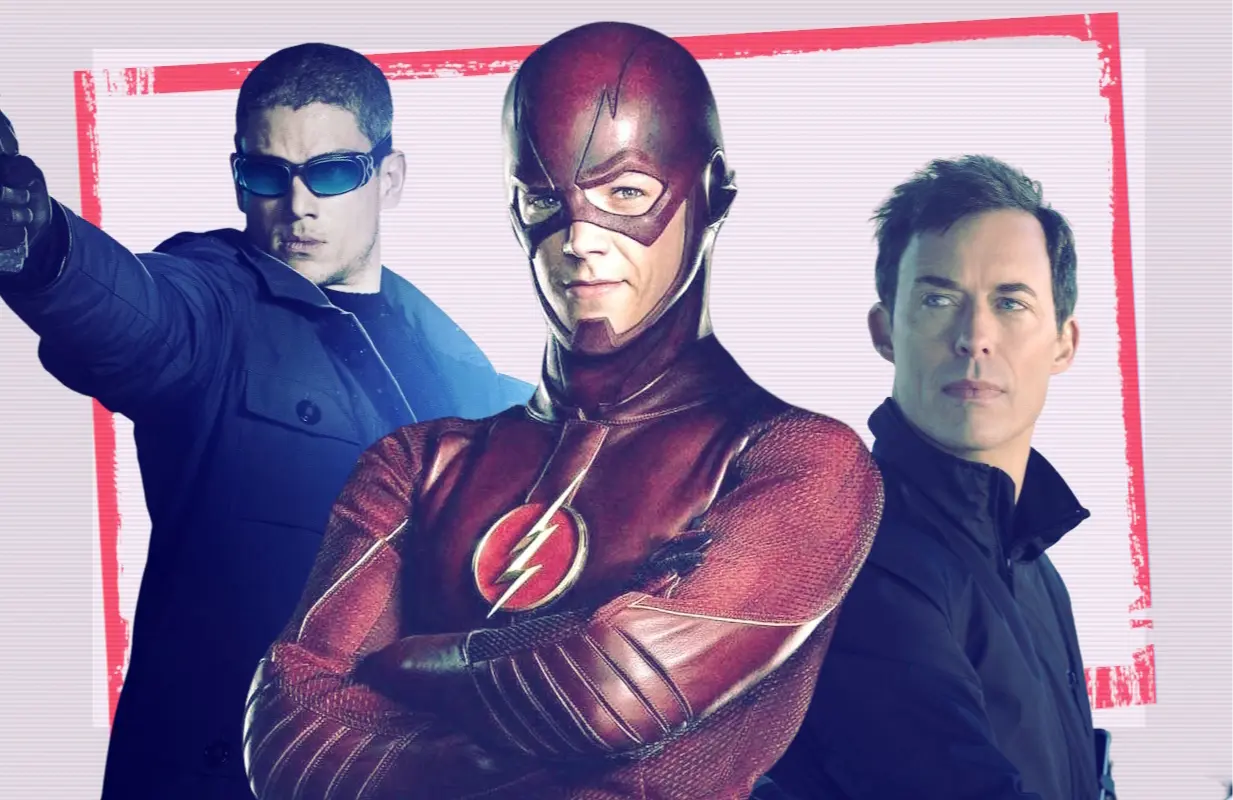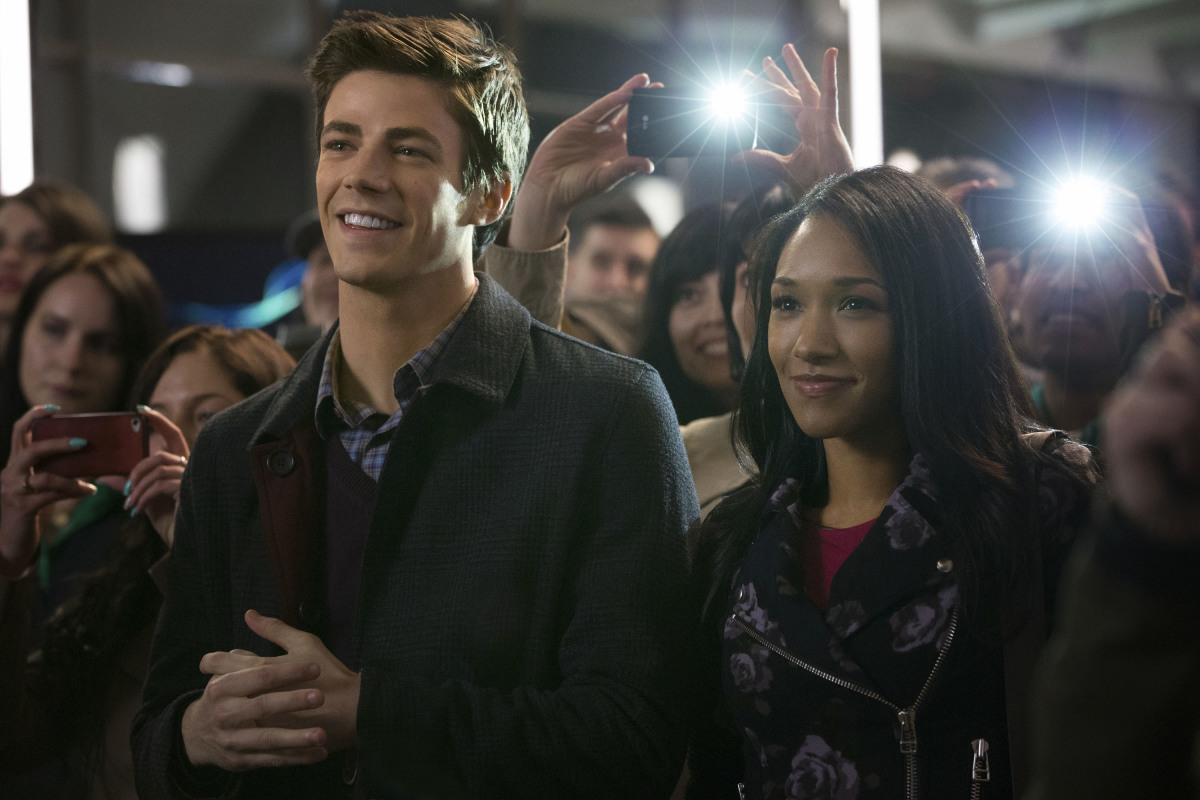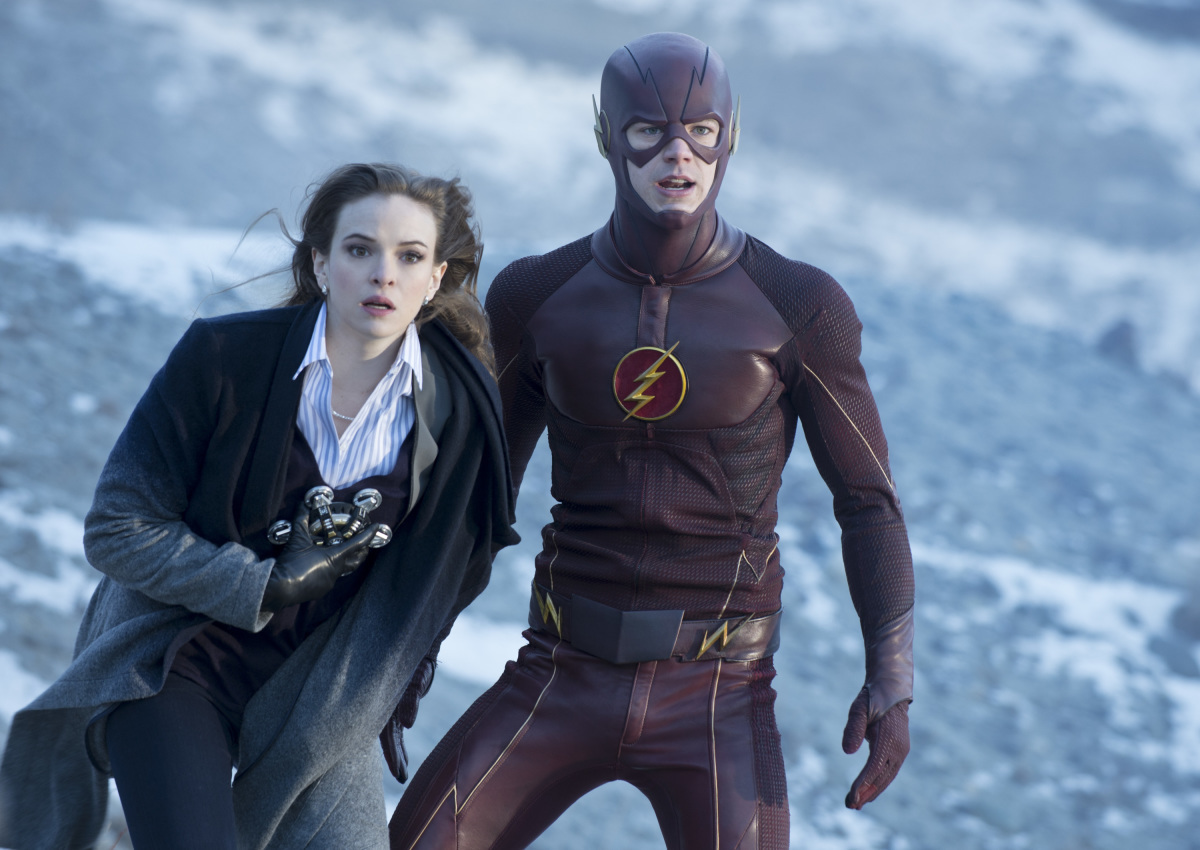The Arrowverse Never Felt More Exciting Than in Season 1 of The Flash
-
 Left to right: Wentworth Miller, Grant Gustin, and Tom Cavanagh in The Flash (Photos: The CW; Primetimer graphic)
Left to right: Wentworth Miller, Grant Gustin, and Tom Cavanagh in The Flash (Photos: The CW; Primetimer graphic)The Flash will soon be a thing of the past, but looking back on the live-action superhero landscape of 2014, its arrival on The CW felt like a bolt from the future. As a spinoff of another DC Comics adaptation for the network, Arrow, the Grant Gustin-led series was less inclined to indulge The CW's initially grim-and-gritty approach to its DC Comics adaptations. Its first season debuted on October 7, 2014, a grinning antithesis to the Steven Amell-led Arrow that signaled that a bright burst of crimson and sunshine was on its way. With its nine-season run finally coming to a close — symbolically bringing the Arrowverse to its end, as The CW's programming changes direction — it's easy to forget how Barry Allen's debut season once held the sweet promise of greater superhero television to come.
It might not have worked out that way, as Season 1 isn't without its angst and darkness. But The Flash — developed by Greg Berlanti, Andrew Kreisberg, and DC’s then-Chief Creative Officer Geoff Johns — has always run a brighter path than Arrow. Even now, its cheery energy feels like it was generated to build on the foundation Arrow laid for a more colorful televised DC universe to come. It's like Amell's scowling Oliver Queen tells Barry Allen (Gustin) early on: "You can inspire people in a way that I never could." If Arrow was a soapier riff on Christian Bale's journey in Batman Begins, then The CW was clearly positioning Gustin to be its version of Christopher Reeve — or, to modernize the analogy a bit, its Chris Evans.
Achieving what would become the Arrowverse — with all its attendant Invasions, Armageddons, Crises, and other calamities — was still a distant goal. In 2014, The Flash was concerned with a more personal battle between its hero (and his time-traveling nemesis, Eobard Thawne, the Reverse-Flash (played by Matt Letscher, among others). But before audiences could wrap their heads around the stakes of this speedster war, which involved concepts taken for granted in today's superhero stories but were innovative and ambitious for a teen drama from almost 10 years ago (time travel! the multiverse!), they would have to learn the ropes alongside the series lead.
Luckily, Barry Allen is a smart enough guy. Possibly too smart, considering he later comes to rely on the expertise of STAR Labs, led by the enigmatic Dr. Harrison Wells (Tom Cavanagh), who is backed by Cisco Ramon (Carlos Valdes) and Dr. Caitlin Snow (Danielle Panabaker). This might explain why Barry's big brains get tamped down somewhat in future seasons. But before he dons that pair of red boots, Barry's a CSI for the Central City Police Department, working alongside his legal guardian Detective Joe West (Jesse L. Martin). In the CCPD's leaky crime lab, Barry flexes his impressive scientific acumen to crack cases with a Sherlock-styled eye for evidential detail. (Those snazzy crime scene sequences were perhaps too evocative and were soon tossed from the show entirely.)
Between cases, however, that's another story. Among Barry's loose arrangement of test tubes and flasks, he dedicates his off-hours to his investigation concerning the murder of his mother, Nora (Michelle Harrison), who died at the hands of an impossible force of nature Barry calls "The Man in the Yellow Suit." Joe's trust in the system puts him at odds with Barry's thesis for the first half of the season — as far as the CCPD is concerned, Barry's father, Henry (John Wesley Shipp), killed Nora and is locked away in Iron Heights Prison where he belongs. It's a vital source of drama as the show finds its feet and serves as a great example of Jesse Martin's dramatic talents, especially when paired against Gustin, who has such a command of tears that it could be his superpower.

Despite the modernity of Barry's TV origin (adapted from comics written by Johns), the initial momentum behind The CW's Flash operated with the Silver Age simplicity of his comic book counterpart: Barry gets struck by lightning and bathed in chemicals, which powers him with superhuman speed. But a 23-episode series led by a trio of showrunners with full access to decades' worth of DC stories meant that Barry's super-saga would get complicated, but quick. The lightning that serendipitously hit Barry in the comics, for instance, takes on sinister origins in the series, stemming from a particle accelerator explosion at a STAR Labs installation that is later revealed not to have been an accident. The STAR malfunction also empowers a host of "metahuman" criminals, who line up in a smoky-eyed queue to blight every successive episode, which lends the series its cozy episodic rhythm. "That particle accelerator is the gift that keeps on giving," Joe tells Barry early on.
Joe's not kidding. Twenty-three episodes that run around 44 minutes a shot is a lot of TV to fill, and The Flash met this challenge by digging through DC's archives to find villains to exploit. The pilot pits Barry and Wells' small crew of STAR scientists (they begin calling themselves "Team Flash" in later seasons) against their first weather-wielding heavy, Clyde Mardon. "Going Rogue," Season 1’s fourth episode, is the first to articulate how the criminal element of Central City has adapted to the zooming presence of what aspiring journalist Iris West (Candace Patton) refers to on her blog as "The Streak." (Barry would secure his famous moniker in the sixth episode.) As "Going Rogue" would prove, some baddies who came through the revolving door of villains on The Flash had the juice to become more than just episodic fodder.
"Going Rogue" also introduces Leonard Snart, aka Captain Cold, played with sneering, vampy gusto by Wentworth Miller. Regarding recurring villain roles on The Flash, which Season 1 kept to a minimum, Miller's episodes were a lively and welcome break from the doom that lay ahead between Barry and The Reverse-Flash. (Miller and his Prison Break co-star Dominic Purcell, who played Cold's hot-headed partner-in-crime, Heat Wave, became so popular that they eventually starred as the antiheroes of DC's Legends of Tomorrow.) Captain Cold, a chilly customer with a sketchy moral code imbued with Miller's incalculable charisma, steals the thunder from Thawne in every one of his appearances and sets a sassy tone for the series's future villain scuffles ahead. "We're gonna have to up our game," Leonard tells a henchman early on.
Leonard's talking about The Rogues, the gallery of ne'er-do-wells who knock Flash around in the comics and stack up as one of the better supervillain coteries this side of Spider-Man. The Rogues never really took off on The Flash for a variety of reasons (one of them being Legends), but Season 1 sure took a shot at building their ranks: the 17th episode, titled "Tricksters," introduces James Jesse (Mark Hamill) and his goony protégé (Devon Graye, who functions as a dimestore rip on Heath Ledger's Joker) as past and present iterations of the Trickster, an old-school Central City threat from the ’90s.
"Tricksters" toys with the metafictional aspect of The CW's superhero shows by putting the legacy casting of Smallville to more ambitious use. (It’s also worth noting that Hamill’s pop culture ubiquity includes his role as The Joker on Batman: The Animated Series.) Older viewers certainly remember that Hamill popped up in the 1990 CBS Flash series alongside John Wesley Shipp's version of Barry Allen, and while the modern pairing of Shipp and Hamill doesn't crack open the multiverse, this instance of fan service was the first big suggestion that The Flash could one day use its legacy stunt casting in new and unexpected ways (as Shipp would discover to his joy in Season 2).
Villains aren't Barry's only recurring headache in Season 1; Iris' journalistic career ambitions, which involve discovering the identity of The Flash, are a plot point almost from the jump. Working on her dissertation, slinging drinks at the local java joint CC Jitters, and stress-eating about her future, Patton begins this season as a human dynamo. While the show spends a strange amount of time pressing the romantic fates of Iris and Barry (since they both grew up in Joe West's home, it's an awkward subplot for both the characters and the audience), Iris only has eyes for Detective Eddie Thawne (Rick Cosnett), Joe's partner at the CCPD who also happens to share a surname with the season's (and, ultimately, the series's) big bad, The Reverse-Flash.
The fascinating thing about The Flash was its forward-thinking approach to audience expectations. The way Season 1 subverts those expectations is even more uncanny; perhaps it was the inclusion of Johns as co-showrunner (for one season, anyway) that the show so brazenly toys with its contingent of viewers who, as die-hard DC fans, believed they were five steps ahead of more casual viewers because they came to the show armed with their encyclopedic knowledge of all things Flash. For instance, comic readers know that Cisco becomes a hero named Vibe, and Caitlin one day becomes the villain Killer Frost, so when will those shoes drop? The presence of Eddie Thawne tosses a screaming red herring at viewers right at the show's beginning; even if Cavanagh's Harrison Wells is glowering in the periphery of virtually every scene he's in, surely viewers couldn't write off Eddie Thawne as a suspect in Nora's death… right?
Of course, things don't work out for Eddie as they often do for handsome young men in treacly CW melodramas. In Episode 21, "Grodd Lives," Eobard, who finally stands revealed as Dr. Wells in disguise, confronts his great-great-great-great grandfather and informs him that he's an especially notable member of the Thawne family in how un-notable he becomes: Eddie's the only Thawne to be forgotten by history. In an additional twist of the knife, Eobard shows Eddie a newspaper byline from the future, which reveals who Iris West eventually does marry. Eddie's fate has rarely been in his hands. Until it suddenly is, as we discover in the Season 1 finale.

The concepts of time travel and alternate realities and the intelligent way they're employed help Season 1 stand apart from virtually every other season of The Flash. Heady concepts are written as though they are entirely new to the viewers and the characters, meted out deliberately by the showrunners without ever once tipping their hand. And the moment in which things truly go bonkers is in "The Nuclear Man," when Det. Joe and Cisco discover a blood spatter in Nora and Henry's former home that belongs to Barry Allen as he exists in the present — not Barry on that awful night when he was just a frightened child. That means: The Flash, Barry as we know him, was in the house the night his mother died.
Time-traveling speedsters were old hat in the comics; in the Arrowverse, this discovery broke open all sorts of possibilities. In an especially dramatic midseason finale, Cisco figures out, to his woe, that his mentor Harrison Wells is in secret the Reverse-Flash and dies for it; Barry reveals to Iris his true identity; and Barry runs so fast that he catches up with himself one day in the past. Later, Barry repeats this eventful day and, in his confusion, changes it, undoing its staggering developments and securing an edge over his enemy for the first time in the show. The problem is that his enemy is Eobard Thawne, a criminal genius from the far future.
Tom Cavanagh might be the biggest reason to revisit Season 1 of The Flash. Cavanagh plays three different roles this season (he'd play a lot more before this show was over), and it's difficult to reconcile them in all their intricacies with his broader comic roles in the NBC series Ed and the 2010 live-action Yogi Bear movie. There's the calculating, inscrutable Dr. Harrison Wells at the beginning of the series, there's the kind, open-hearted Harrison Wells we see in flashbacks before Thawne kills him, and then there is Eobard Thawne as Harrison Wells, the speedster-killer from the future who has manipulated events — including the STAR Labs catastrophe — to create the one man he hates more than anything so that he can return to his future: The Flash.
Cavanagh is astonishing to watch in this season; the malevolent smirk on his face as he gives Barry the first of many pep talks in the pilot episode takes on so many new meanings upon rewatch. "Run, Barry," Wells says, beginning his tutelage of Barry in all the mysteries of the Speed Force. "Run."
So Barry runs. And runs. Up buildings and through them, past Mach-2 and faster, collapsing Weather Wizard's twisters and outpacing The Trickster's bombs. Barry runs, and becomes everything he was ever supposed to be in The Flash Season 1: a son, a hero, and the fastest man alive. As he enters a strange cosmic force in the season finale and the score swells once more into the nervous frenzy that has given this series its propulsion for nine seasons, we remember what Barry Allen has asked of his audience from the show's beginning. "You need to believe in the impossible. Can you do that?" For a time, Barry, yeah. We really, really could.
Jarrod Jones is a freelance writer currently settled in Chicago. He reads lots (and lots) of comics and, as a result, is kind of a dunderhead.
TOPICS: The Flash, The CW, Barry Allen, Candice Patton, Danielle Panabaker, Dominic Purcell, Grant Gustin, Mark Hamill, Tom Cavanagh, Wentworth Miller, Arrowverse, DC Comics